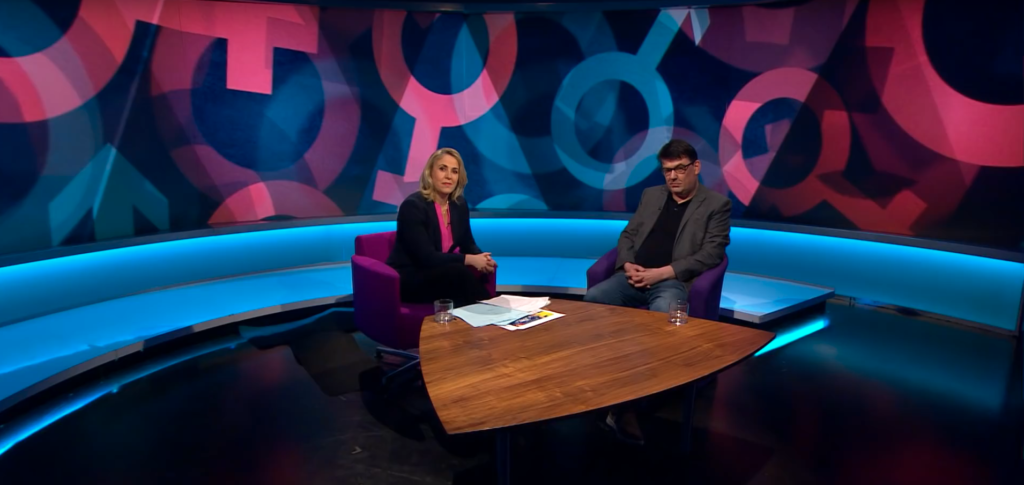BBC pelted with complaints after Graham Linehan compared doctors treating trans kids to Nazi experiments

Graham Linehan performed a comedy show outside to tiny crowd after being axed from an Edinburgh venue over continued anti-trans campaigning. (BBC Newsnight/Screenshot)
British broadcaster BBC has been pelted with viewer complaints after Graham Linehan appeared on Newsnight and compared doctors treating trans youth to Nazis experimenting on children in concentration camps during the Holocaust.
On a February 10 interview, he said there are “a couple of parallels” between Nazi doctors and the doctors treating trans children today.
“Children are basically being experimented on with puberty blockers.”
Linehan, 51, had appeared on the slot to discuss his public row with some members of the LGBT+ community. But the spot proved a lightning rod for criticism as 115 viewers complained, a fortnightly BBC complaints report said.
The complaints, the report stated, concerned “bias against Graham Linehan / felt Graham Linehan’s views on the transgender community were offensive”.
Graham Linehan asked about his contribution to ‘toxic’ debate on trans rights.
In a question about the “toxicity” of the debate over trans rights, journalist Sarah Smith asked whether Graham Linehan stepping in had made the debate any better.
“A lot of people say that the language you’ve used, some of the dismissive terms that you’ve bandied about, have actually increased the toxicity of this debate,” she said.
Linehan asked if Smith could give him an example.
“Yes. I can give you several if you want,” Smith replied. “So what about comparing people in the trans debate to speaking out against Nazis? That’s pretty extreme.”
Linehan said that there are “a couple of parallels”.
“One is that, at the moment, children are basically being experimented on with puberty blockers,” Linehan said.
What are puberty blockers?
Puberty-pausing medication, known as puberty blockers, are prescribed in order to delay puberty until a trans teenager is old enough to make decisions about having gender-affirming medical treatment.
The treatment has been used for decades and a recent piece of research found that access to the drugs is “life-saving” for trans teenagers.
The landmark study, published in medical journal Pediatrics in January 2020, was the first to look at the impact of access to puberty blockers on suicide risk of trans kids.
The study found that if trans teenagers have access to puberty blockers their chance of suicide and mental health problems significantly declines.
Graham Linehan backtracks…
Graham Linehan made one attempt to backtrack on his own words, saying, “No, no, no, don’t get me wrong, I’m not comparing it to Nazi concentration camps.”
When Smith questioned this – “That’s basically what you said, wasn’t it? Experimenting on children is what the Nazis did and what doctors are doing today?” – Linehan replied: “Well, essentially, if you look at the Tavistock [and Portman NHS Foundation Trust, which offers gender identity service], 35 psychologists have quit the Tavistock in three years.”

Father Ted writer Graham Linehan (R) discussing recent controversy surrounding his thoughts on trans folk on BBC Newsnight. (Screen capture via YouTube)
“One of the other things that Tavistock whistleblowers reported was that homophobic parents were bringing in their gender non-conforming kids and telling them to fix them.
“There was a dark joke that went round the Tavistock that in a couple of years there would be no gay people left. That’s why I compare it to eugenics programmes and things like that. It is extremely serious.”
Smith replied: “Right, talking about eugenics, and comparing trans activists to Nazis is not going to make this debate less toxic. What you are doing is fanning the flames, you’re throwing fuel on this.”
… and then doubles down on comments comparing trans healthcare to Nazis.
Towards the end of the seven-minute interview, Smith again asked whether Linehan was seriously comparing healthcare provision for trans youth to Nazi doctors.
“If you want to have a reasonable debate about what’s going on with gender identity in this country we can’t talk about Nazis in the same breath,” she said.
Linehan replied: “The thing about the Nazi comment was what I was trying to get across was that this is a hinge moment in history, just like during the Nazis.
“And we always ask ourselves the same questions. We ask ourselves, what would I have done? Would I have bowed done, would I have done everything I was told to do, or would I have resisted?
“Would I have stood up, and stood up alongside people who were trying to do the right thing? That’s what I’m trying to do at the moment. And it’s being made very very difficult.”
A spokesperson for the BBC said: “Mr Linehan appeared on the programme to discuss why he has become involved in a public row with some members of the transgender community.
“No one watching the programme could be in any doubt that he was robustly challenged on his views. Stonewall was invited to take part in the programme and a statement from the charity was read out on air.”
The BBC informed PinkNews that LGBT+ rights charity Stonewall had been invited on the programme but declined, instead providing a statement.
Helen Belcher, co-founder of Trans Media Watch – a UK charity dedicated to improving media coverage of trans and intersex issues – said: “The BBC did a reasonably good job of challenging Linehan’s stance, but that doesn’t make up for the bias they have displayed in reporting on trans issues over recent months.
“Trans people are too often talked about rather than talked with, and it is clear from the piece framing the Graham Linehan discussion that the BBC still lacks basic knowledge of trans lives and the law affecting us.”

